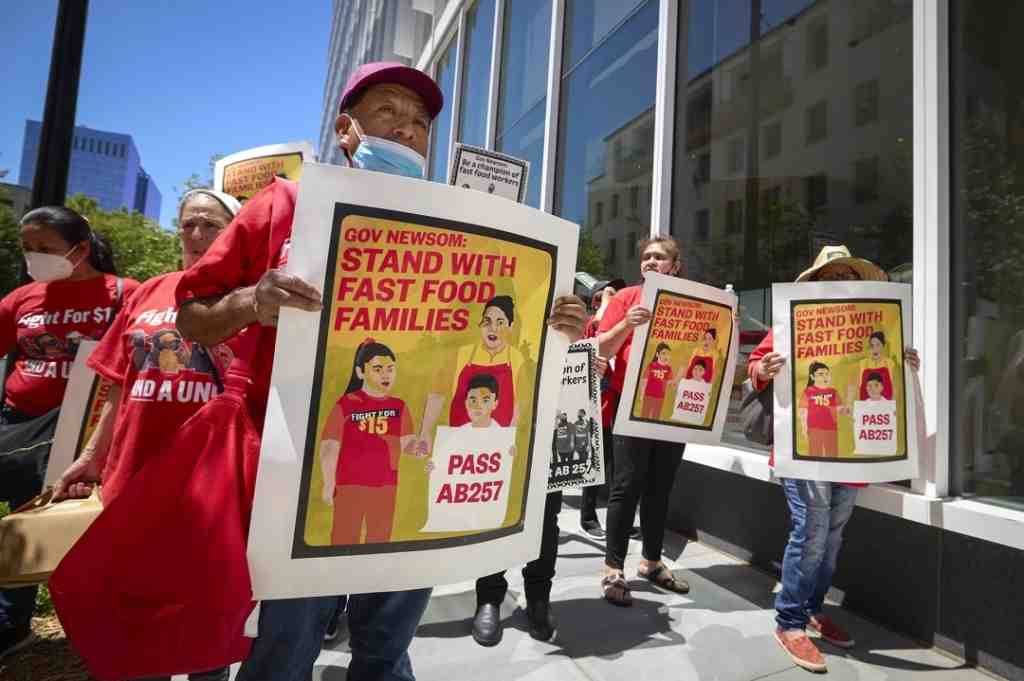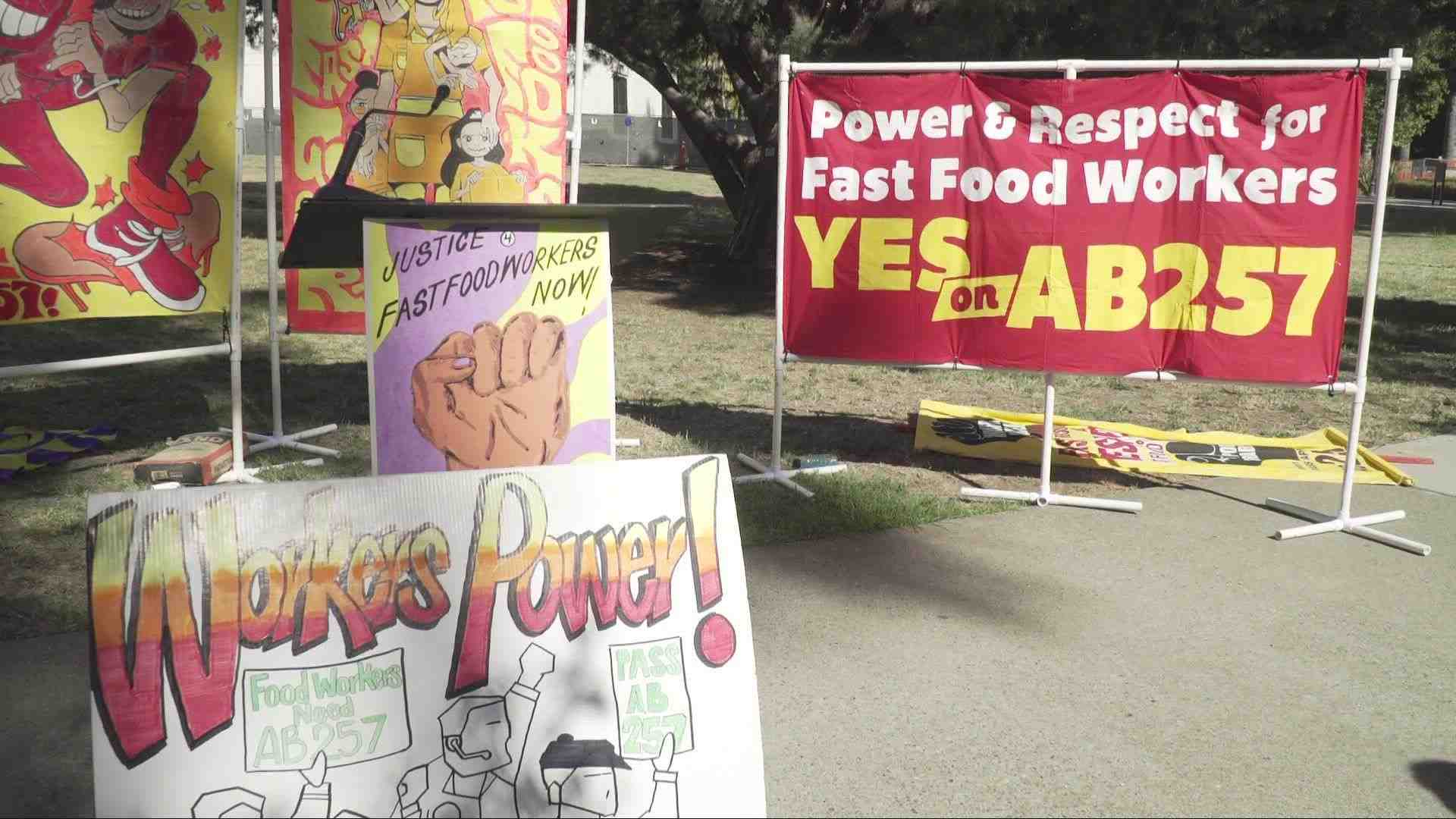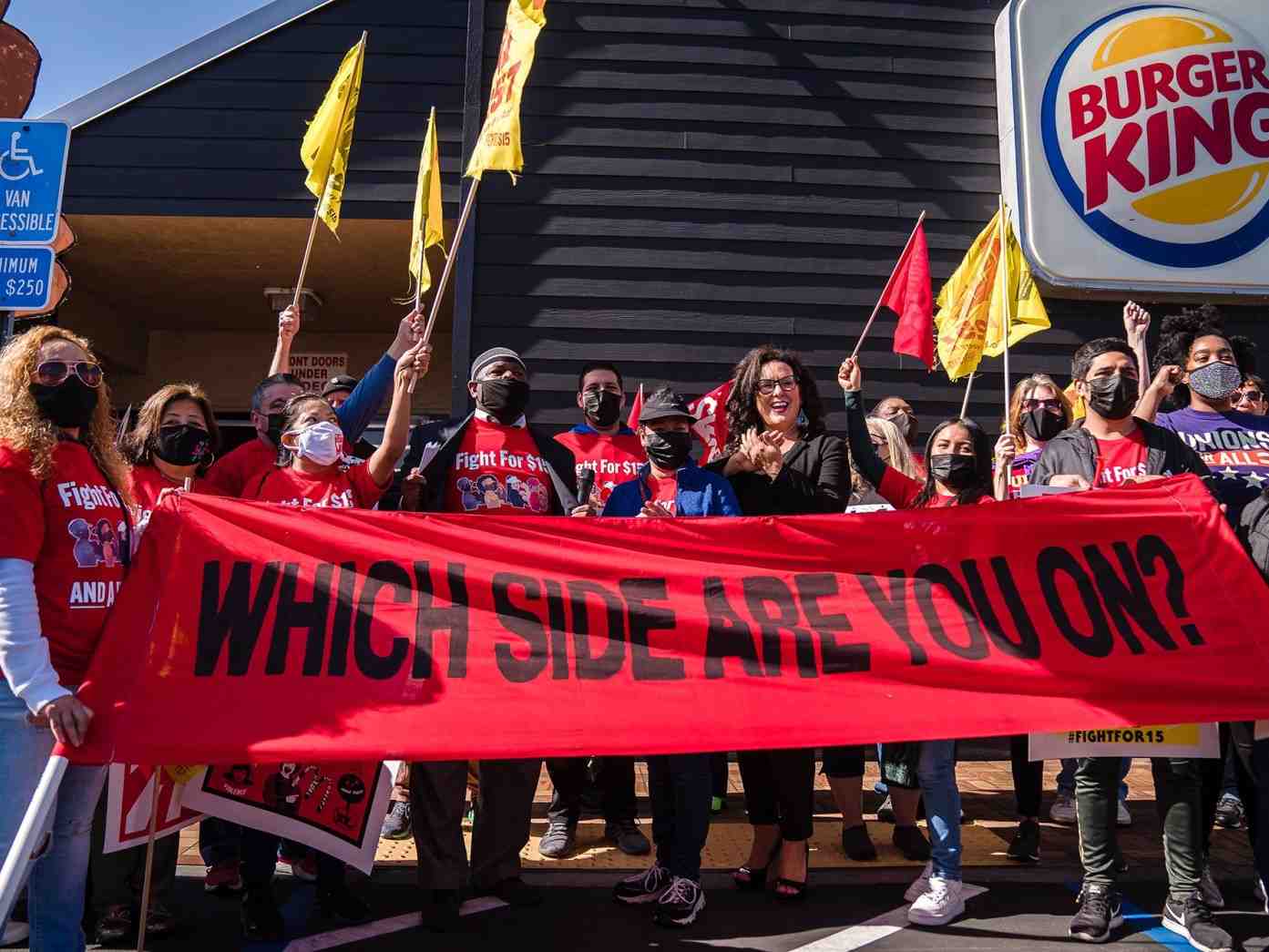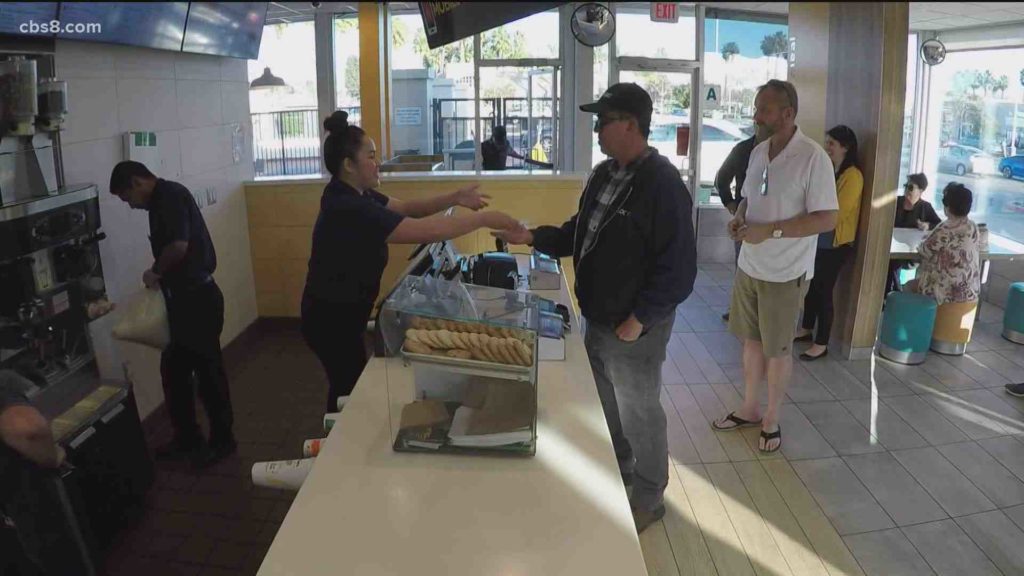If signed by Gov. Gavin Newsom, the measure would create a state board to set an industry-wide minimum wage and safety requirements.
As a subscriber, you have 10 gift items to offer each month. Anyone can read what you share.
The California State Senate on Monday passed a bill that could transform the way the service industry is regulated by creating a board to set wages and improve working conditions for fast-food workers. .
The measure, known as A.B. 257, passed by a vote of 21 to 12. The state Assembly had previously approved a version of the measure, and it now requires the approval of Governor Gavin Newsom, who n has not indicated whether he will sign it. The bill was violently opposed by the fast food industry.
The bill could herald an important step towards sectoral bargaining, in which workers and employers negotiate industry-wide pay and working conditions, as opposed to company-level bargaining, in which workers negotiate with individual companies at individual sites.
“In my opinion, this is one of the most important pieces of state employment law that has been passed in a long time,” said Kate Andrias, an employment law expert at the University of Columbia. “It gives workers a formal seat at the table with employers to set industry-wide standards that go beyond setting minimum wages.”
While sectoral bargaining is common in Europe, it is rare in the United States, although some industries, such as auto manufacturing, have arrangements that come close to it. The California bill would not bring true sectoral bargaining – which involves workers negotiating directly with employers, instead of a government entity setting general standards – but incorporates crucial elements of the model.
The bill would create a 10-member board that would include worker and employer representatives and two state officials, and would review compensation and safety standards in the restaurant industry.
The council could issue health, safety and anti-discrimination regulations and set a minimum wage for the entire industry. The legislation caps the figure at $22 an hour next year, when the statewide minimum wage will be $15.50. The bill also requires annual cost-of-living adjustments for any new salary floors beginning in 2024.
Restaurant chains with at least 100 locations nationwide would fall under the council’s jurisdiction – including companies like Starbucks that own and operate their stores as well as franchisees of larger corporations like McDonald’s. Hundreds of thousands of state workers would be affected.
The council would be closed after six years but could be reconvened by the legislature.
Mary Kay Henry, president of the nearly two million member Service Employees International Union, which has pushed for the legislation, said it was essential because of the challenges workers faced when tried to change policies by unionizing store by store.
“The stores are closed or the franchise owner sells or the multinational takes the lease off the real estate,” Ms Henry said.
Franchise industry officials say it’s extremely rare to close a store in response to a union campaign. Starbucks recently closed several company-owned stores across the country where workers had unionized or were trying to unionize, citing safety concerns like crime, although the company also closed a number of stores non-unionized for the same reasons.
Industry officials say the bill will increase labor costs, and therefore menu prices, when inflation is already a widespread concern. A recent report by the Center for Economic Forecasting and Development at the University of California at Riverside estimated that employers would pass on about a third of any increase in labor compensation to consumers.
“We are pulling the fire alarm in every state to wake up our members to what is happening in California,” said Matthew Haller, president of the International Franchise Association, an industry group that opposes the bill. “We are concerned about other states – the multiplier effect of something like this.”
Ingrid Vilorio, who works at a Jack in the Box franchise near Oakland, Calif., and who pressed lawmakers to back the bill on several trips to Sacramento, the state capital, said she believed the measure would lead to safety improvements — for example, through rules that require employers to quickly repair or replace broken equipment like grills and deep fryers, which can cause burns.
Ms Vilorio said she also hoped the council would crack down on issues such as sexual harassment, wage theft and denial of paid sick leave. She said she and her colleagues went on strike last year to demand masks, hand sanitizer and the Covid-19 sick pay they were entitled to receive.
Jack in the Box did not respond to a request for comment.
Haller said state agencies are already authorized to crack down on employers who violate laws governing wage payment, safety, discrimination and harassment.
“The state has the existing tools at its disposal,” Haller said. “They should be funded more fully rather than putting a punitive target on a subsection of a sector.”
Mr Haller and other opponents cited criticism from the state Department of Finance saying the bill “could lead to a fragmented regulatory and legal environment for employers” and “exacerbate existing delays” in the enforcement by increasing the burden on agencies overseeing the rules. The bill does not provide additional funding for law enforcement agencies.
David Weil, who under President Barack Obama oversaw the agency that enforces the federal minimum wage, said while funding is essential for labor regulators, the new council could benefit a wide range of workers even without additional funding. For example, he said, raising the minimum wage for fast-food workers could raise wages for workers in other sectors, such as retail, which compete with fast-food restaurants for Workforce.
But Dr Weil agreed that creating new standards in the fast food industry could end up diverting resources from labor and employment law enforcement to other industries where workers can be all also vulnerable.
Opponents have been successful in winning a number of concessions from the state Senate, such as preventing the council from creating sick or paid leave, or rules that restrict hours.
The Senate also eliminated a so-called joint liability provision, which would have allowed regulators to hold parent companies like McDonald’s liable for violations committed by franchise owners.
The bill, known as AB 257 or the FAST Recovery Act, passed the California Assembly in January and is due for a full vote in the state Senate this month.
What is the current California minimum wage?

Minimum wage in California is currently $15.00/hour for employers with 26 or more employees, and $14.00/hour for employers with 25 or fewer employees. Some cities and counties have higher minimum wages than the state rate. UC Berkeley maintains a list of city and county minimum wages in California.
When did California adopt the $15 minimum wage? UPDATE: Governor Jerry Brown signed the California bill on April 4, 2016.
What is minimum wage in California right now 2021?
California’s current minimum wage is $15 per hour for employers with at least 26 workers and $14 per hour for employers with fewer workers, although it was set to increase to $15 on May 1. January.
What is the new minimum wage in California 2022?
As a result, on May 12, 2022, Governor Gavin Newsom announced that California’s minimum wage for all businesses should increase to $15.50 effective January 1, 2023.
What state has the highest minimum wage 2022?
Until a federal minimum wage increase occurs, here are the 10 states with the highest minimum wages as of January 1, 2022.
- Colorado $12.56. …
- Oregon $12.75 (tie)…
- Maine $12.75 (tie)…
- Arizona $12.80. …
- New Jersey $13 (tie)…
- Connecticut $13 (tie)…
- New York $13.20. …
- 8. California $14.
What is the new minimum wage for 2022 in California?
As a result, on May 12, 2022, Governor Gavin Newsom announced that California’s minimum wage for all businesses should increase to $15.50 effective January 1, 2023.
What is California’s minimum wage right now?
| Year | CA Minimum Hourly Wage for Large (26 Employees) and Small (25 Employees or Less) Employers |
|---|---|
| 2019 | $12.00/$11.00 |
What is the minimum wage in California 2025?
The initiative would require California employers with 26 or more employees to pay minimum wage rates of $16 by 2023, $17 in 2024 and $18 by 2025.
What is the fast Recovery Act?

The FAST Recovery Act would establish an unelected, unaccountable council of 13 political appointees and union representatives called the “Fast Food Industry Council” that would have regulatory authority over California locations of national counter service restaurants. .
What is AB 257 in California? The California State Senate on Monday passed a bill that could transform the way the service industry is regulated by creating a board to set wages and improve working conditions for fast-food workers. . The measure, known as A.B. 257, passed by a vote of 21 to 12.
Why do students eat fast food?

Low cost and good taste were the main reasons students consumed fast food, while high cost and preference for other restaurants were the main reasons for not consuming it. Fast food was eaten most often at lunch (46.4%); the burgers and fried chicken were the best choices; 54.7% of students spent $5-6 per meal.
Why do students eat junk food? It’s usually high in salt, sugar, and fat, which trigger pleasure centers in our brains, make us feel so good, and encourage us to keep eating. You see, our brains are relatively big and require a lot of energy to do their job. So we evolved to love energy-dense foods.
What are good reasons for eating fast food?
The most common reasons for eating at fast food restaurants were: fast food is fast (92%), restaurants are easy to get to (80%), and food tastes good (69%).
What are two positives to fast food?
The biggest benefits of fast food
- It is possible to eat healthy in a quick service restaurant. …
- This saves time when a meal is needed. …
- This makes food affordable for some families. …
- It supports local merchants. …
- It lets you know what to expect from the food. …
- It always puts food choices in the hands of consumers.
What is the main reason people eat fast food?
People who eat in a fast food restaurant. Many Americans lead busy lives and don’t have much time to prepare food for their families. Faced with greater time constraints related to work, childcare and travel, they often turn to ready meals.
Why do teenagers consume fast food?
Fast food remains very convenient for most teenagers. 33.3% of teenagers said they ate more fast food because it suited them; or because they don’t have time to cook, it’s good food, it’s cheaper, or for other more specific reasons.
How common is fast food among teens?
The results showed that the vast majority of participants (95.4%) ate at fast food restaurants (Table 3). Fast food was eaten once a week by 52.8% of teenage girls and 60.9% of young adult girls. In addition, 25.2% of teenage girls and 20.3% of young adult girls ate fast food twice or more per week.
What is the main reason people eat fast food?
People who eat in a fast food restaurant. Many Americans lead busy lives and don’t have much time to prepare food for their families. Faced with greater time constraints related to work, childcare and travel, they often turn to ready meals.
What is ab2257?

AB 2257 significantly expands the scope of the referral agency exemption, expressly applying the exemption to a non-exclusive list of additional services, including counseling, youth athletic coaching, caddying, weddings or events, services provided by wedding and event vendors and interpretation services.
What is California AB 5? California Assembly Bill 5 (AB5) extends employee classification status to certain construction workers. Under AB5, companies must use a three-pronged test to prove that workers are independent contractors and not employees. 1. AB5 was designed to regulate companies that hire workers in large numbers, like Uber, Lyft, and DoorDash.
Is AB 5 still the law?
California law provides many benefits to workers who are employed by a separate employer.
What is the new AB5 law?
Assembly Bill 5 (or “AB5”), passed by the California State Legislature and signed into law by Governor Gavin Newsom in September 2019, effectively reclassifies a large number of state workers as as employees rather than as independent contractors.
Is California enforcing AB5?
The state of California is about to start enforcing its AB5 labor laws, rejecting calls from the trucking industry for a delay to give drivers and carriers more time to comply.
What is the Borello test?
The Borello test is a list of requirements outlining the qualifications of a worker who can be classified as an independent contractor versus a full-time employee. This was the worker classification standard in the state of California before the ABC test.
What is the ABC test for independent contractors in California?
AB 5 requires the application of the “ABC test” to determine whether workers in California are employees or independent contractors for purposes of the Labor Code, Unemployment Insurance Code, and Welfare Commission wage orders. be industrial (CBI).
What is the ABC test?
The “ABC test” is a legal test used by many states in employment laws, such as workers’ compensation or unemployment compensation, to determine whether a worker is an employee or a contractor. independent.
Who is exempt from AB 5 law?
1. The worker is free from the control and direction of the hiring organization with respect to the performance of the work. 2. The worker performs work outside the business of the hiring entity.
Who is an independent contractor under AB5?
The individual is independent of the hiring organization in the performance of the work, both under the contract for the performance of the work and in fact. The person performs work that is outside the business of the hiring entity.
How do you avoid AB5?
Which occupations are exempt from AB5?
- A. …
- B…
- Control over the way of working. …
- Control of financial details. …
- Nature of the relationship. …
- Start a business. …
- Obtain an EIN or TIN from the IRS. …
- Operate as a separate business.

